All about Gender
28 element(s) found
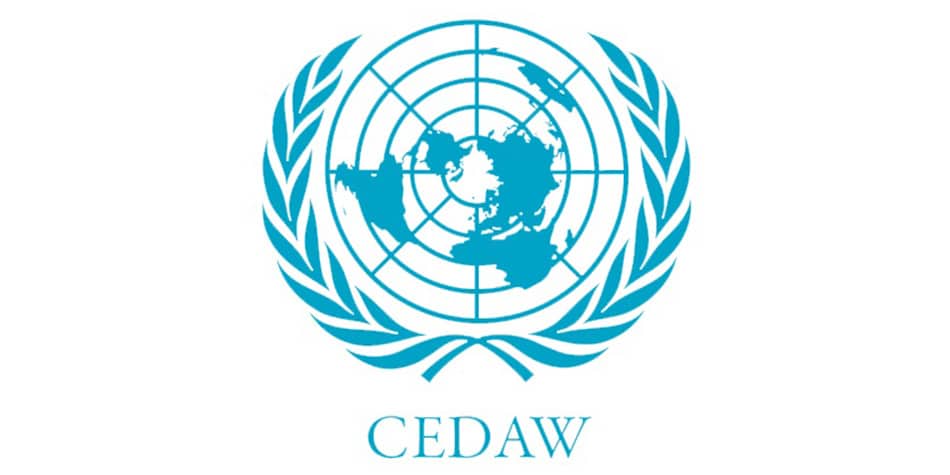
Article(s)
Abolitionist advocacy at the 88th CEDAW Session
on 7 June 2024
The 88th session of the Committee on the Elimination of Discrimination Against Women (CEDAW) was held in Geneva, Switzerland, from May 13 to 31, 2024.
2024
Brazil
Estonia
Gender
Kuwait
Malaysia
Montenegro
Republic of Korea
Rwanda
Singapore
Document(s)
Gender Matters: Women on Death Row in the United States
By Sandra Babcock, Nathalie Greenfield, Kathryn Adamson, Cardozo Law Review , on 24 April 2024
2024
Academic report
Gender
United States
Women
More details See the document
This article presents a comprehensive study of 48 persons sentenced to death between 1990 and 2023 who presented as women at the time of their trials. This research is the first of its kind to conduct a holistic and intersectional analysis of the factors driving women’s death sentences. It reveals commonalities across women’s cases, delving into their experiences of motherhood, gender-based violence and prior involvement with the criminal legal system. This report also explore the nature of the women’s crimes of conviction, including the role of male co-defendants and the State’s use of aggravating factors. Finally, it reveals for the first time the extent to which capital prosecutions are dominated by men—including judges, elected District Attorneys, defense attorneys, and juror forepersons—and explain why gender matters in determining who lives and who dies
- Document type Academic report
- Countries list United States
- Themes list Gender / Women
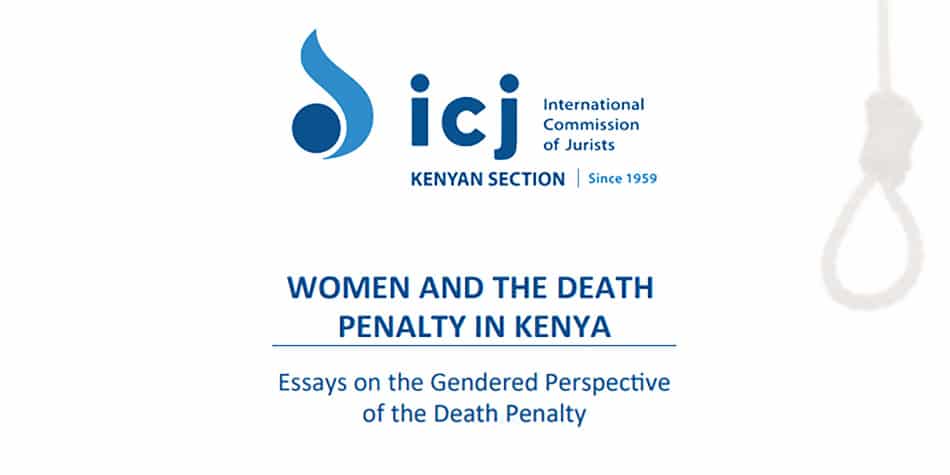
Article(s)
ICJ Kenya Makes Gender Discrimination in Capital Punishment Visible
By World coalition against the death penalty, on 8 March 2024
Kenya is one of a few target countries for the World Coalition Against the Death Penalty’s “Gender and the Death Penalty” campaign; a campaign that is being conducted in collaboration with its member organisations in the country, namely the Kenyan Section of the International Commission of Jurists (ICJ Kenya) and the Kenya Human Rights Commission.
2024
Gender
Gender
Kenya
Kenya
Document(s)
Does care have to be at the periphery if crime is at the centre? A conversation that unspools the various threads tying feminism with crime.
By The Third Eye, on 15 February 2024
2024
Article
Gender
Women
More details See the document
Published on January 30, 2024.
The Third Eye invited Maitreyi Misra of Project 39A to help us think through our central idea: why do we need a feminist way of looking at crime, and how does that help the larger goal of social justice?
Project 39A is inspired by Article 39-A of the Indian Constitution, a provision that furthers the intertwined values of equal justice and equal opportunity by removing economic and social barriers. Using empirical research to re-examine practices and policies in the criminal justice system, Project 39A aims to trigger new conversations on legal aid, torture, forensics, mental health in prisons, and the death penalty.
- Document type Article
- Themes list Gender / Women
Document(s)
Women and The Death Penalty in Kenya: Essays on the Gendered Perspective of the Death Penalty
on 2 February 2024
2024
NGO report
Death Row Conditions
Fair Trial
Gender
Kenya
Women
More details See the document
This publication seeks to make visible the gender and intersectional discrimination faced by women in the judicial process leading to the death penalty. Through the various articlesin this publication, the authors bring to light the reality of women facing the death penalty through a different lens.
The first author, Shekinah Bright Kiting’a, in making a compelling case for abolition of the death penalty, explores how the death penalty uniquely affects women in the context of motherhood. Further, she highlights the rights and well-being of the children affected by their mothers’ death sentences, revealing flaws in our legal and ethical systems. With the overall aim of advocating for its abolition due to its significant impact on both parenthood and children’s rights, her article seeks to push for reforms that honour motherhood and prioritize children’s well-being in these difficult circumstances.
Kenaya Komba dissects gender disparity in the judicial system by exploring the intersection of domestic violence and the death penalty. In making a case for a restorative approach to justice, her article analyses the impact of capital punishment on victims of domestic violence and the systemic injustice and biases they continue to grapple with. Her elaborate analysis of the Constitution of Kenya, 2010 and the Protection Against Domestic Violence Act, 2016, highlights the urgent need for reform in the legal system.
While Analyzing the role the media plays in shaping perceptions of women on death row, Patricia Chepkirui evaluates the implications of positive and negative media portrayals of such women by highlighting the ethical responsibilities of media in the coverage of women on death row cases. The article ultimately underscores the significance of responsiblemedia coverage in ensuring that media exposure of cases of women on death row is fair,balanced, and respectful of their rights and dignity.
Alex Tamei delves into the intricacies of abuse, gender-based violence, and trauma as mitigating factors in death penalty sentencing for women. His article comparatively analyses two Kenyan cases of murder in retaliation to intimate partner violence, seeking to shed light on the plight of victims of gender-based violence. The article effortlessly brings out the nexus between the death penalty and intimate partner violence and makessolid recommendations for change.
The fifth author, Patience Chepchirchir, delves into the nexus between psychological abuse and provocation. Through her article, she brings out the scope of psychological abuse while focusing on the linkage between emotional abuse and provocation and how the same can be considered as mitigating factors. Through an elaborate analysis of case law, she makes a case for psychological abuse of women as a mitigating circumstance during sentencing.
Stella Cherono’s article reflects on the intersectional discrimination faced by women in the criminal trial process leading to death row. The article highlights the complex and overlapping forms of discrimination women experience during the pretrial, trial and sentencing stages. Through her comprehensive analysis of gendered pathways to offending and imprisonment, she challenges how society perceives discrimination.
Loraine Koskei Interrogates the emerging jurisprudence on Intimate Partner Violence.Her article lays out the gendered factor in the commissioning and sentencing of women convicted of murder and offers possible recommendations.
- Document type NGO report
- Countries list Kenya
- Themes list Death Row Conditions / Fair Trial / Gender / Women
Document(s)
Gender, Violence, and the Death Penalty
By Sandra Babcock and Nathalie Greenfield, California Western International Law Journal , on 1 February 2024
2024
Academic Article
Gender
Women
More details See the document
Published in 2023.
This article is the first in a series that will systematically explore how gender has affected the criminal proceedings of women currently on death row. For this inaugural article, we have undertaken the first—and, to our knowledge, only comprehensive analysis of gender-based violence (“GBV”) in the lives of all women currently on death row, examining the prevalence of GBV and how it has shaped the lives and affected the criminal prosecutions of women facing execution. Our research reveals, for the first time, that almost every woman on death row in the United States has experienced GBV. Indeed,the great majority have experienced more than one incident of GBV in their lifetime. Our findings align with previous studies demonstrating that women’s pathways to incarceration are paved with physical, sexual, and psychological abuse. Our research further shows that both in the United States and around the world, defense attorneys frequently fail to present evidence of GBV in women’s capital trials. When they do introduce such evidence, they fail to fully explain the nature of their clients’ victimization and the harm they have suffered as a result. Moreover, prosecutors frequently rely on gendered tropes to discredit women’s accounts of violence such as childhood sexual abuse, rape, and intimate partner violence. Consequently, those who sentence women to die rarely comprehend the extensive trauma that the women have endured throughout their lives, and how that trauma relates to their legal and moral culpability.
- Document type Academic Article
- Themes list Gender / Women
Document(s)
Documentaire: femmes dans la couloir de la mort
By Investigations et Enquêtes , on 17 January 2024
2024
Multimedia content
Death Row Conditions
Gender
United States
Women
More details See the document
Un regard déchirant sur la vie des femmes condamnées et les failles du système judiciaire américain. Aux Etats-Unis, 54 femmes « attendent » l’exécution de leur peine. Linda Carty et Melissa Lucio sont emprisonnées au Texas, Shawna Forde en Arizona. Elles se livrent. Parmi les prisonnières, certaines espèrent la révision de leur procès.
- Document type Multimedia content
- Countries list United States
- Themes list Death Row Conditions / Gender / Women
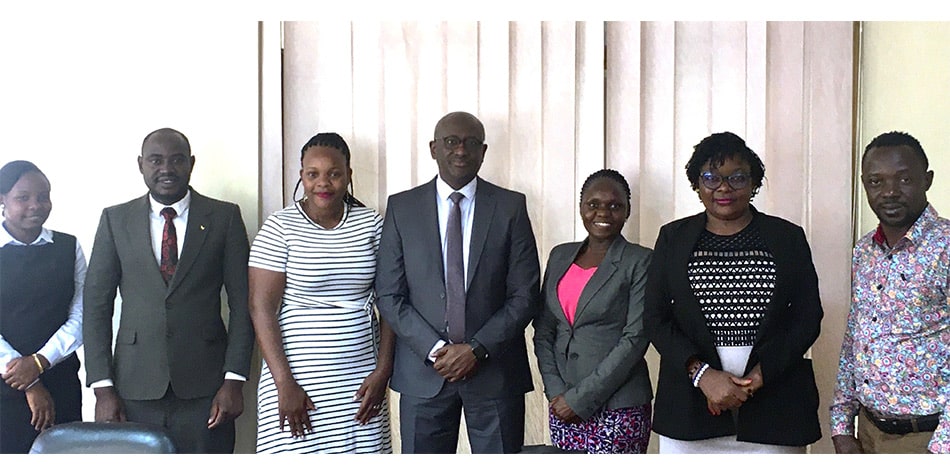
Article(s)
Abolition en Afrique – 77ème session ordinaire de la Commission africaine des droits de l’homme et des peuples
By Yasin Sentumbwe Munagomba et Bronwyn Dudley, on 12 January 2024
La 77ème Session ordinaire publique la CADHP (Commission africaine des droits de l’homme et des peuples) s’est tenue à Arusha, en Tanzanie, du 20 octobre au 9 novembre 2023.
2024
Gender
Gender
Uganda
United Republic of Tanzania
Uganda
United Republic of Tanzania

Article(s)
Abolition in Africa- 77th Ordinary Session of the African Commission on Human and Peoples’ Rights
By Yasin Sentumbwe Munagomba and Bronwyn Dudley, on 12 January 2024
The ACHPR (African Commission on Human and Peoples’ Rights) 77th Public Ordinary Session was held in Arusha, Tanzania from 20 October – 9 November 2023.
Gender
Trend Towards Abolition
Uganda
United Republic of Tanzania
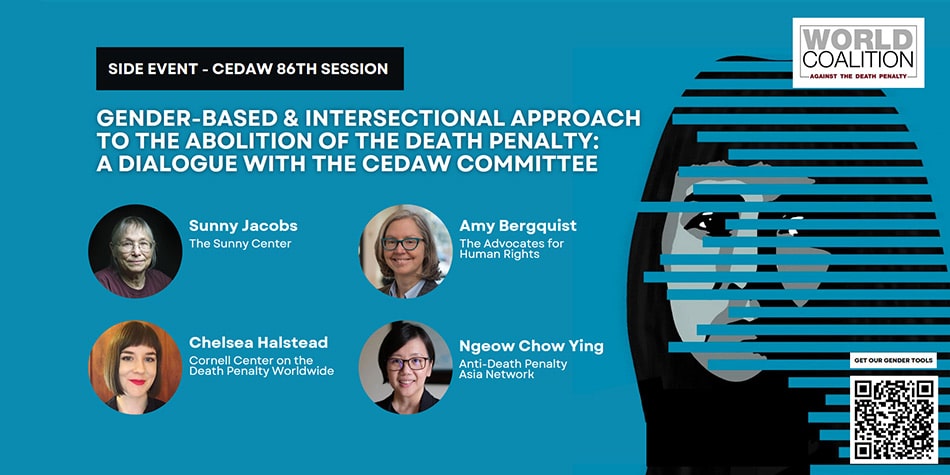
Article(s)
Les expert(e)s CEDAW remercient les membres de la Coalition mondiale pour leur évènement parallèle sur le genre et la peine de mort #CEDAW86
By Venus Aves, on 8 November 2023
Le 22 octobre 2023, la Coalition mondiale contre la peine de mort (Coalition mondiale) a organisé un événement parallèle à huis clos sur une approche sensible au genre et intersectionnelle de l’abolition de la peine de mort, dans le cadre de la 86e session du Comité pour l’élimination de la discrimination à l’égard des femmes […]
2023
Gender

Article(s)
CEDAW experts welcome World Coalition members in the #CEDAW86 side event on gender and the death penalty
By Venus Aves, on 8 November 2023
On 22 October 2023, the World Coalition Against the Death Penalty (World Coalition) organized a closed-door side event on a gender-based and intersectional approach to abolition as part of the 86th session of the Committee on the Elimination of Discrimination Against Women (CEDAW).
Gender
Document(s)
Leaflet Women and the Death Penalty
By World coalition against the death penalty, on 2 October 2023
2023
World Coalition
Gender
frMore details Download [ pdf - 1448 Ko ]
- Document type World Coalition
- Themes list Gender
- Available languages Brochure femme et peine de mort
Document(s)
Leaflet LGBTQIA+ people and the Death Penalty
By World coalition against the death penalty, on 2 October 2023
World Coalition
Gender
frMore details Download [ pdf - 861 Ko ]
- Document type World Coalition
- Themes list Gender
- Available languages Brochure personnes LGBTQIA+ et peine de mort
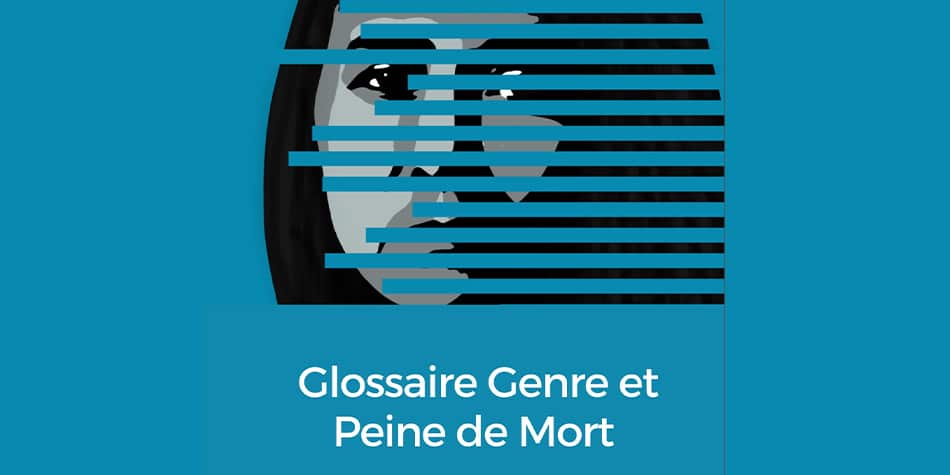
Article(s)
La Coalition mondiale lance un glossaire sur le genre et la peine de mort
By Coalition mondiale contre la peine de mort, on 15 August 2023
Dans le cadre de ses efforts visant à intégrer une perspective de genre dans le mouvement abolitionniste, la Coalition mondiale contre la peine de mort vient de publier un glossaire sur le genre et la peine de mort.
2023
Gender
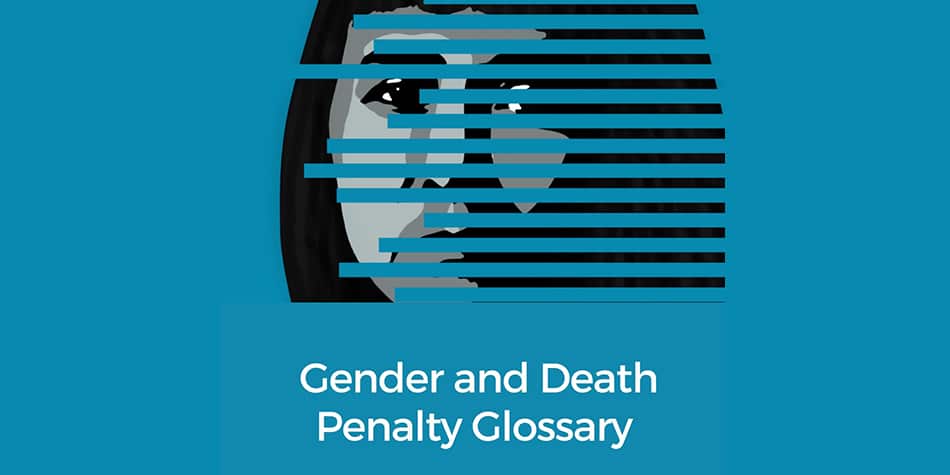
Article(s)
World Coalition launches glossary on gender and the death penalty
By World coalition against the deaht penalty, on 15 August 2023
As part of its efforts to mainstream a gender lens in the abolitionist movement, the World Coalition Against the Death Penalty just released a glossary on gender and the death penalty. The first of its kind, this publication presents and defines terms relevant to gender-sensitive abolitionist work that recognize the various forms of gender-based discrimination […]
Gender
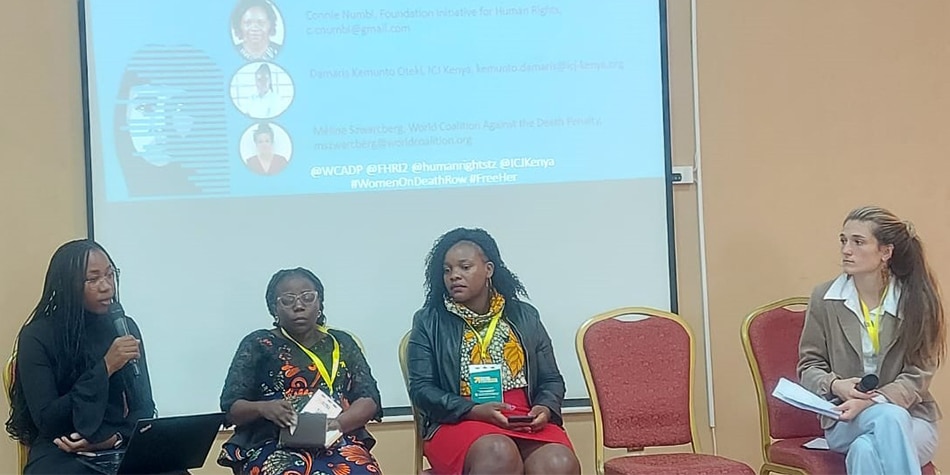
Article(s)
Plaidoyé pour la reconnaissance de la réalité des femmes condamnées à mort dans la lutte pour les droits des femmes
By Coalition mondiale contre la peine de mort, on 15 August 2023
Du 16 au 20 juillet, une délégation de la Coalition mondiale, composée de Connie Numbi de Foundation for Human Rights Initiative, Dr. Anna Henga de Legal Human Right Center, Damaris Kemunto de la Section kenyane de la Commission internationale des juristes (ICJ Kenya), et Méline Szwarcberg, responsable de projet femme et genre à la Coalition […]
Gender
Women

Article(s)
Advocating for the recognition of women sentenced to death in the fight for women’s rights
By World coalition against the death penalty, on 15 August 2023
From July 16 to 20, a World Coalition delegation comprising Connie Numbi of Foundation for Human Rights Initiative Uganda, Dr Anna Henga of Legal Human Right Center Tanzania, Damaris Kemunto of the Kenyan Section of the International Commission of Jurists (ICJ Kenya), and Méline Szwarcberg, Women and Gender Project Manager at the World Coalition, attended […]
Gender
Women
Document(s)
Women and Death Penalty Factsheet – World Day 2023
By World coalition against the death penalty, on 15 August 2023
World Coalition
Gender
frMore details Download [ pdf - 424 Ko ]
- Document type World Coalition
- Themes list Gender
- Available languages Faits et chiffres Les femmes et la peine de mort - 21e journée mondiale contre la peine de mort
Document(s)
FACTS AND FIGURES LGBTQIA+ People and the Death Penalty – 21st World Day Against the Death Penalty
By World coalition against the death penalty, on 15 August 2023
World Coalition
Gender
frMore details Download [ pdf - 502 Ko ]
- Document type World Coalition
- Themes list Gender
- Available languages Faits et chiffres Les personnes LGBTQIA+ et la peine de mort - 21e journée mondiale contre la peine de mort
Document(s)
Data Mapping: Women on Death Row
By World Coalition against the Death Penalty , on 1 August 2023
2023
NGO report
Gender
frMore details Download [ pdf - 813 Ko ]
In 2021, the 19th edition of the World Day Against the Death Penalty (“World Day” on October 10) was dedicated to the invisible reality of women on death row, paving the way for new data on the issue of women sentenced to death. Many members of the World Coalition Against the Death Penalty (“World Coalition”), in preparation for 10 October, conducted research to document the situations of women facing the death penalty around the world. To systematize the information collected and have a global understanding of women sentenced to death, the World Coalition conducted a data systematization exercise.
This short report presents the main conclusions of this country exercise. These findings are a compilation of existing data available to the World Coalition Against the Death Penalty and its members organization up to December 2022.
- Document type NGO report
- Themes list Gender
- Available languages Cartographie de données : les femmes dans le couloir de la mort
Document(s)
Gender and Death Penalty Glossary
By World Coalition against the Death Penalty, on 1 August 2023
World Coalition
Gender
frMore details Download [ pdf - 829 Ko ]
As part of the integration of a gender and intersectional approach into its strategy, the World Coalition Against the Death Penalty (World Coalition) decided to develop a glossary to identify and define the key terms of which the abolitionist movement should be aware to consider gender and other axes of intersectional discrimination at work in the capital punishment process, and more broadly to mainstream gender into their abolitionist work. This glossary was developed based on existing glossaries of World Coalition members on closely related topics, existing international definitions and standards established by international human rightsmechanisms as well as based on definitions written by international organizations specializing inwomen’s rights and LGBTQIA+ people’s rights.This glossary aims to support the abolitionist movement in recognizing the gender and intersectional biases at work in the judicial process leading to the death penalty and to contribute to the developmentof a common language around these issues, a process initiated a few years ago by members of theWorld Coalition Against such as the Cornell Center on the Death Penalty Worldwide. Moreover, this glossary also aims to promote the integration of a gender approach into the internal workings o fabolitionist organizations.
- Document type World Coalition
- Themes list Gender
- Available languages Glossaire Genre et Peine de mort
Document(s)
How to Insert Gender issues in Abolitionist Advocacy?
By World Coalition against the Death Penalty, on 1 August 2023
Lobbying
Gender
frMore details Download [ pdf - 710 Ko ]
This tool was developed by the World Coalition Against the Death Penalty (World Coalition) in partnership with the Advocates for Human Rights (TAHR), after noting the limited integration of gender issues into the abolitionist advocacy of the World Coalition’s member organizations. This tool has also been edited and enrichened by the World Coalition’s Gender Working Group.
As part of the “Leave No Woman Behind on Death Row” project, this tool aims to assist World Coalition members and partners in implementing gender-sensitive abolitionist advocacy.
In this document, intended to be a practical tool, guidance is provided on how to incorporate gender-specific recommendations into abolitionist advocacy with human rights bodies. This tool focuses recommendations made by civil society organizations (CSOs) to international and regional human rights bodies, intended to encourage national authorities to act in a certain way. Human rights mechanisms and bodies serve as crucial actors in legitimizing and supporting CSOs work on the ground. A recommendation made by a CSO can, in turn, be accepted by a human rights special mechanism and be transformed into an official recommendation to the State. From there, CSOs can continue to use this official recommendation in their national advocacy to strengthen their claim and position, fulfilling a virtuous circle in advocacy work.
In this document, the recommendations made are done pending full abolition of the death penalty. They are seen as transitional steps towards full abolition of the death penalty in law and in practice.
This tool is divided into two sections. The first part focuses on how to increase visibility of the discrimination faced by women in the judicial process leading to the death penalty. The second part focuses on the discrimination faced by LGBTQIA+ people during the same judicial process. In both sections, definitions are provided as well as background information in order to understand the issues at stake in each of the themes.
- Document type Lobbying
- Themes list Gender
- Available languages Comment insérer les questions de genre dans le plaidoyer abolitionniste ?
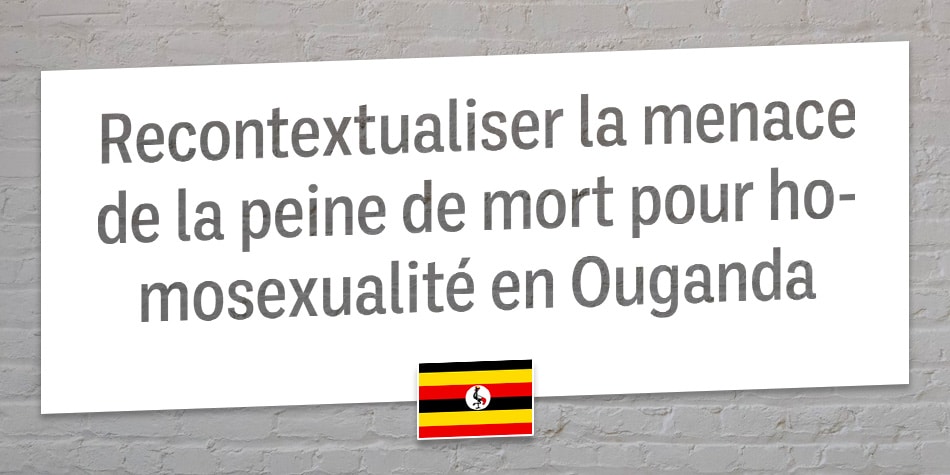
Article(s)
Recontextualiser la menace de la peine de mort pour homosexualité en Ouganda
By Méline Szwarcberg, on 2 May 2023
Le parlement ougandais a voté, mardi 21 mars, une loi qui criminalise durement les personnes ayant des relations sexuelles consensuelles entre personnes de même sexe. A ce jour, la loi n’a pas été validée par le président Museveni. Parmi une série de lourdes peines cette loi prévoit la peine de mort pour délit « d’homosexualité aggravé ». […]
2023
Gender
Uganda
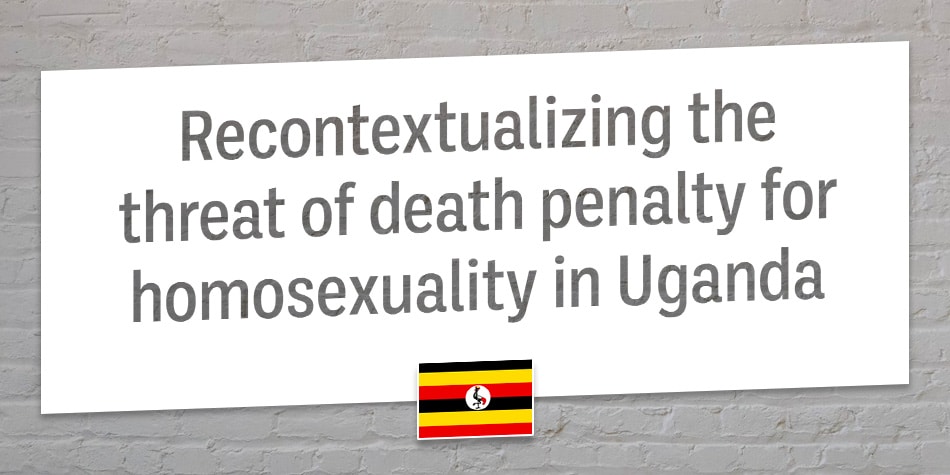
Article(s)
Recontextualizing the threat of death penalty for homosexuality in Uganda
By Méline Szwarcberg, on 2 May 2023
On Tuesday March 21, the Ugandan parliament passed a law that severely criminalizes people who have consensual same-sex relations. At the end of April, the law had still not been validated by the President Museveni. Among a range of harsh penalties, the law would allow the death penalty for the crime of « aggravated homosexuality […]
Gender
Uganda
Document(s)
Seven Winters in Teheran
By Steffi Niederzoll, on 24 March 2023
2023
Multimedia content
Gender
Iran (Islamic Republic of)
Women
frMore details See the document
In the summer of 2007, an older man approaches Reyhaneh Jabbari and asks the architecture student who has a side job as an interior decorator for her help in the design of offices. During the site inspection, he tries to rape her. Reyhaneh stabs him in self-defence. She is arrested for murder and sentenced to death. Reyhaneh was to spend the next seven years in prison while her family hired lawyers and made the public aware of the case. However, in spite of the efforts of national and international politicians and human rights organisations, the Iranian judiciary continued to cite the “right of blood-revenge”. This meant that, as long as Reyhaneh did not withdraw her accusations against the man, his family could demand her death. Reyhaneh stuck to her testimony and was hanged at the age of 26.
In her moving and shockingly topical documentary debut, director Steffi Niederzoll uses among other things original audio and visual material that was smuggled out of Iran. This film, in which Holy Spider actor Zar Amir Ebrahimi lends Reyhaneh her voice, makes visible the injustice in Iranian society and portrays an involuntary heroine who gave her life in the fight for women’s rights.
- Document type Multimedia content
- Countries list Iran (Islamic Republic of)
- Themes list Gender / Women
- Available languages Sept hivers à Téhéran

Article(s)
Le 8 ème Congrès Mondial réaffirme l’importance d’une réflexion fondée sur le genre
By Coalition mondiale contre la peine de mort, on 16 December 2022
La 19e Journée Mondiale Contre la Peine de Mort a souligné les discriminations intersectionnelles auxquelles sont confrontées les femmes dans le processus judiciaire menant à la peine de mort, visibilisant une facette des liens existants entre la peine de mort et la discrimination fondée sur le genre.
2022
Gender

Article(s)
The 8th World Congress reaffirms the importance of gender-based discussions
By World Coalition Against the Death Penalty, on 16 December 2022
The 19th World Day Against the Death Penalty highlighted the intersectional discrimination that women face in the judicial process leading to the death penalty, making visible one facet of the links between the death penalty and gender discrimination.
Gender
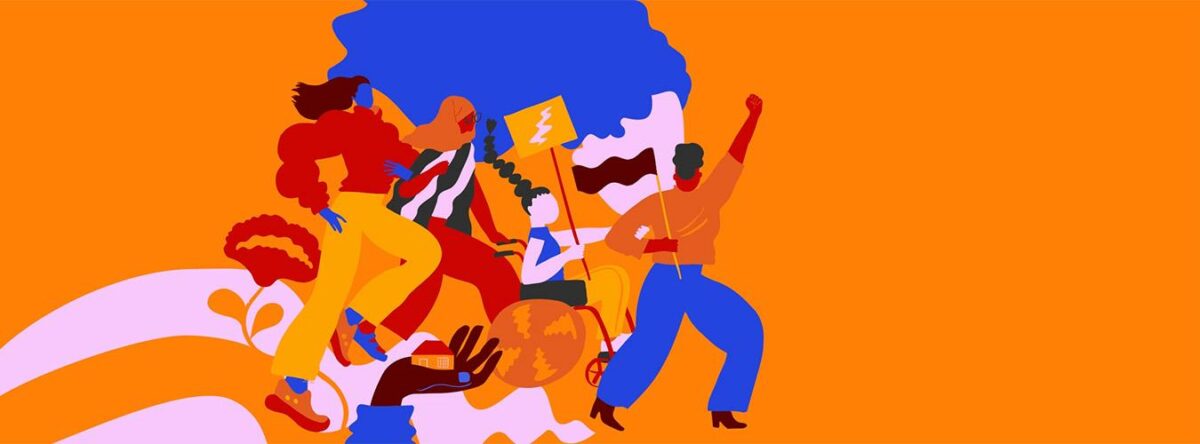
Article(s)
Reflecting on the links between the death penalty and gender-based violence
By World Coalition Against the Death Penalty, on 25 November 2022
On 25 November 2022, International Day for the Elimination of Violence against Women, the World Coalition Against the Death Penalty, through the testimony of representatives of abolitionist member and partner organizations, wishes to raise awareness of the links between the death penalty and violence against women and gender minorities and call out the unjust and […]
2022
Gender
Kenya
Sri Lanka
Uganda
Women
Brazil
Abolitionist for ordinary crimes onlyDeath penalty legal status
CountriesEstonia
Abolitionist for all crimesDeath penalty legal status
CountriesKuwait
RetentionistDeath penalty legal status
CountriesMalaysia
RetentionistDeath penalty legal status
CountriesMontenegro
Abolitionist for all crimesDeath penalty legal status
CountriesRepublic of Korea
Abolitionist in practiceDeath penalty legal status
CountriesRwanda
Abolitionist for all crimesDeath penalty legal status
CountriesSingapore
RetentionistDeath penalty legal status
Countries
